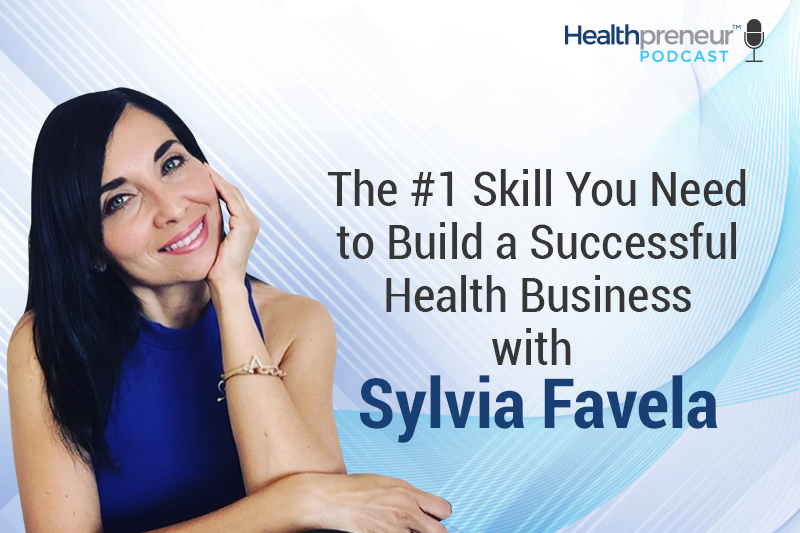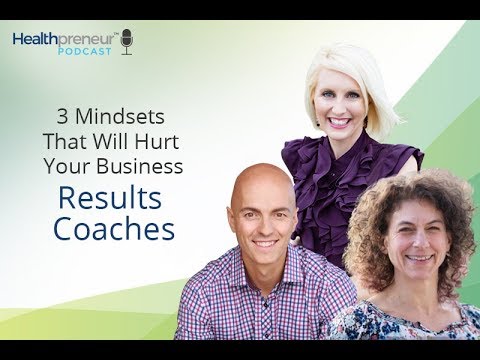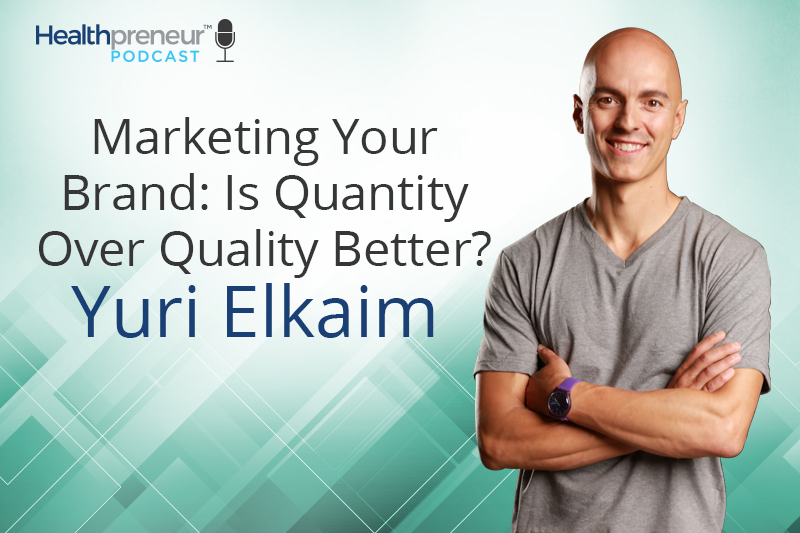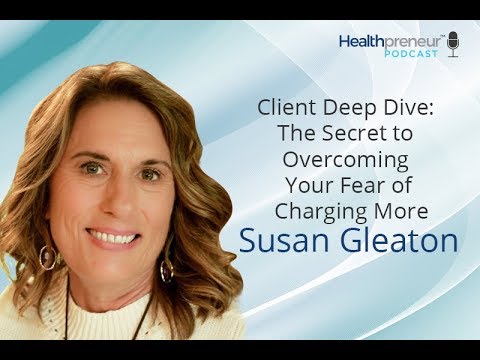Impact vs. Importance (Are You Lying to Yourself?)
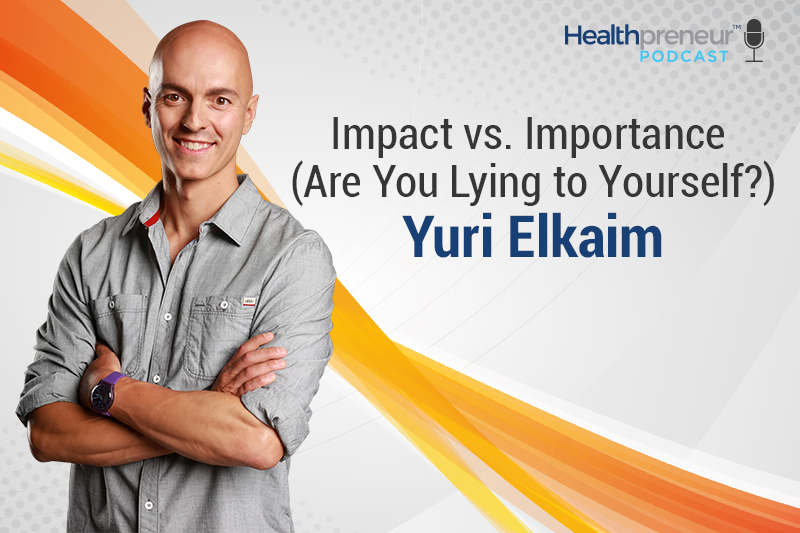
Welcome back to the Healthpreneur podcast! Today I’ve got a great solo round for you that, I have to warn you, may ruffle a few feathers. But honestly, what I am talking about today is almost like a public service announcement. Things are changing with online businesses and if you’re sticking with the old model, it is going to cost you—literally.
Today I am going to be talking about importance vs. impact. While a lot of people think they are focused on creating an impact, a lot of times they are actually focused on making themselves seem and feel important. And there’s nothing wrong with that! But at the end of the day, the stuff that makes you feel important isn’t going to impact people’s lives.
Oh, and the other thing? Most of that importance stuff also isn’t going to make you a lot of money! So, not only am I going to go over the difference between importance and impact, but I’m going to show you how you can gain tremendous amounts of profit while still creating tons of impact. Like I said before, this may ruffle a few feathers because I’ll be going over some hard truths—but I am doing this with your best interest in mind, and I promise that you will get some insight out of this episode.
In this episode I discuss:
2:00 – 7:30 – Differentiating between importance and impact
7:30 – 9:30 – A book won’t transform someone’s life.
9:30 – 14:30 – Running the numbers
14:30 – 18:00 – We want to make money and there’s nothing wrong with that.
18:00 – 22:00 – You have the skill set and the expertise.
Transcription
Welcome back to another episode of the Healthpreneur Podcast. It is the middle of February and man, it’s a little bit chilly here in Toronto. But the good news is that I’m headed down to Scottsdale in two weeks for our health business accelerator workshop. We’ve got an amazing crew of healthpreneurs coming down and we’re going to show them how to get a lot more clarity, better clients and more profit.
If you’d like to join us at an upcoming workshop just let me know. Head on over to the website, Healthpreneurgroup.com/workshop and see if you qualify to join us at our next one.
I just got back from Park City, Utah and I was over there with a group of colleagues and friends for another little mastermind. You can tell that I’m constantly investing in myself. Relationships are really the key to growing your business sustainably, I think, because the power of relationships—whether they’re joint venture partners or colleagues that you can bounce ideas off of—is really very important for your growth and business.
It’s one of the things I tell my kids, I’m like, “If nothing else your surroundings are going to determine your future so make sure you choose your friends wisely.” We had a great time in Park City, Utah–did some skiing, did some spa, some facials and massages.
It was a really nice weekend of pampering and I’ve got to thank my good friend Dr. Trevor Cates for hosting us there which was a lot of fun. Now I’m back in the nice cold weather in Toronto.
Differentiating between importance and impact
Today I want to pick up on what we talked about last Monday. We talked about building your income before your influence. I want to talk about another concept I’ve talked about from stage, which is this whole idea of getting clear on what is important to you.
Is it importance or impact?
A lot of people confuse the two, and I’ll give you an example from myself because I’m the most guilty of all parties here. Back in 2014 my first book, The All-Day Energy Diet, was coming out. It was a published book and my sole focus for that book was for it to hit the number one spot on the New York Times list.
What I did was I went to Google Images, I typed in New York Times list, I got this really cool image of the top ten list. I printed it out, scratched out or whited out the number one spot, and I put my book, The Energy Diet by Yuri Elkaim in the number one spot.
I attached that to my vision board and I had that vision board on my phone as well. Every single day I was looking at that image. That’s all I was focused on, it was number one New York Times, number one New York Times, number one New York Times list.
I’m telling you, the power of attention is undeniable. You put your mind to something and you’ve got extreme clarity on it, it’s amazing what can happen. So, that was probably about eight months, maybe even a bit longer before the book came out, so it was this maniacal obsession about that.
I remember when the book released a couple weeks later, I got a phone call from my agent. I’m having dinner with the family, it’s like 6:30 on a Tuesday night and I get a call. She’s like, “You’ve hit number two. You hit number two.”
I was like, “Sorry, number two what?” She was like, “You hit number two on the New York Times list.”
I was like, “Holy freakin’ amazing.” I was jumping up and down, I was so excited. The number one spot was Peter Thiel with his book Zero to One which was released at the same time as mine.
I was like, “You know what? The co-founder of PayPal and Facebook, I’ll give him that. That’s totally fine.” I wasn’t upset, I was not upset that I didn’t hit number one. Number two was absolutely amazing.
We beat out Steve Harvey and some really, really big authors and books. It was an amazing accomplishment and I was so proud of it. We sold a lot of books and hopefully helped a lot of people, but I want to just clarify something with you. This whole story, if you haven’t taken note, was all about me. It was all about me feeling important and me building my ego and meputting another badge on my sash of accomplishments, if you will.
It had nothing to do with impact. And here’s the thing that I realized. I’m not saying that this is true for every author or everyone, I’m just saying from what I’ve observed. It’s not in all cases, but in some cases.
A book won’t transform someone’s life
I’ve been on both sides of this. I’ve been on the front of stage side of things where we think that someone wants to write a New York Times bestselling book because it’s going to impact a lot of people and they’re going to get their name out there. But behind the curtains what’s really going on are conversations like, “Oh, what spot did you hit on the list? How many books did you sell? What kind of advance did you get?” It has nothing to do with impacting people’s lives.
When I even talk about this it kind of makes me nauseous, to be very honest with you. I’m not trying to throw anyone under the bus here because I’m the most hypocritical person who can possibly be talking about this—because I was that guy.
But I’m sharing this with you from the perspective of having done that and seeing the nonsense that other people, other “gurus” in our space have gone through to get their book on the list. For what reason?
They say it’s impact but it’s really, in a lot of cases, importance.
There was actually a really interesting article in the New York Times… An author who had written 14 books—bestselling books—encouraging people not to even bother writing a book because he said it was nothing more than an exercise in stroking your ego.
That was pretty much what it was. And I still do believe that everybody has a book inside them and I believe it’s a great endeavor to write a book and share your thoughts and do all that stuff. I think it’s great for your business if it’s used properly.
But I want us to be very honest about something. Why are we doing this? Why are we doing the things that we do? Why do we care if we have a huge social media following? Why is it important that we hit the New York Times list—which is almost impossible nowadays—with your book?
Is it because you truly want to impact people or is it because you need a level of significance that you’re not currently getting? If the answer to that question is impact, then I’m going to challenge you.
I’m going to call BS on this, because a book is never going to transform someone’s life. It won’t. There have been books that have been impactful for me in my life and have given me ideas that I turn back to, but nothing has been more impactful than the investment I’ve made to work at a very close level with coaches and mentors.
There’s a big distinction here, because the level of investment we make in terms of our time and money is really what will determine how committed someone is, how committed we are to achieving a specific goal.
If you really want to impact someone’s life, it’s not going to come through a book or a product.

We sell some amazing high quality supplements. I don’t even call them supplements, they’re really custom formulated foods—like our greens powder. And yes we have amazing testimonials, it gives people more energy and all this sort of stuff … but it’s not the level of impact that we think it is.
That’s why I really want to get clear about this; if impact is the thing you’re after then the true, most honest way of doing that is working more closely with fewer people at higher price points and really walking them step-by-step from where they are to where they want to be.
What that means to your business is it moves away from becoming a very disconnected—just a “buy my products” type of business—to a much more involved, “Let’s do this together” type of business.
I want to clarify just one more thing with that. I’m not saying you should do one-on-one coaching, because it’s a waste of time and you’re not going to trade your time for money.
Running the numbers
But what I am saying is, building a business that is built around some degree of expertise you have to help people achieve a specific outcome. And the cool thing is that you can build a coaching program around your book. Everything you talk about in your book can be the milestones and steps you walk people through in a smaller group coaching program.
And I’ll give you an example of this. Actually, if you haven’t attended our new webinar, the Seven Figure Health Business Blueprint please do so. It’ll really illuminate you, it’ll open your eyes. Check it out, Healthpreneurgroup.com/9.
In the webinar, I give an example. Let’s say you want to make $60,000/month, which for a lot of people is beyond comprehension. You’ve got a book on one end which you sell for $30 and you have a coaching program which you sell for $3,000. Maybe the coaching program is over eight weeks and the desired outcome is the same—they say they want to lose weight.
So with this example, if you’re selling the book, in order to make $60,000 a month at a $30 price point you need 2,000 customers to buy that every single month. To get 2,000 customers let’s assume a 1% conversion rate, which is very typical for a sales page when selling a product of that nature.
In order to get 2,000 people to buy, assuming a 1% conversion rate, you need 200,000 people landing on your web page. I don’t know about you, but 99% of people I know in this space are not generating that type of traffic. Most people just want to build their list because they’ve got a hundred people on them.
If you think that having a list of a hundred or a thousand or even 10,000 people is going to move the needle for you when you’re selling a $30 book—it’s not going to happen. I can guarantee that.
So you need 200,000 people to land on that webpage. If you don’t have it internally then how else can you get it? The simplest way would be to go buy some Facebook ads, right? Now, assuming a cost per click of 50 cents, that is going to cost you $100,000 to drive 200,000 visits to that web page.
But remember, we’re only making $60,000 in revenue. So we’re actually in the hole $40,000. That model doesn’t make sense at all.
By contrast, let’s say you’re selling a $3,000 coaching program. For $60,000 a month you would need 20 people, 20 clients per month to achieve that. You don’t need 200,000 people visiting your website if you do things properly.
And our model is very simple—we run Facebook ads, do a webinar. On the webinar we move people or invite the right people to a strategy call. When you do that you’ll find that it’s a lot easier to engage with people and move them to the next level—if it’s done properly.
Because as you probably know, there’s a big difference between having a Facebook ad and having one that works. Having a webinar and having one that works. Having a phone call with someone and having a phone call that enrolls them into your coaching programs.
This is what we do every single day, this is how we’re helping our clients build their businesses, this is exactly how we built Healthpreneur as well. We’re doing this stuff every single day in the trenches.
A lot of people say, “Well Facebook ads didn’t work for me.” That’s because you didn’t know what you’re doing! Or, “All webinars don’t work any more.” Well they do. We’ve been using them for ten years and they’re only getting better.
You have to know how to do this stuff properly. But when you only have to bring on 20 clients per month, I’ll tell you from historical data, you’re looking at maybe having 40 conversations. Maybe. If you’re not closing or enrolling one out of two people you speak with, then they’re not qualified properly.
That’s on the high end. So, you’re spending 20 hours a month (if it’s a 30 minute call) to enroll 20 people and then you’re spending another handful of hours per week—anywhere from two to four hours a week—delivering the coaching program to these clients to make $60,000 a month.
I’m not saying you’re going to absolutely do this. I’m not saying everyone’s going to make this type of money. Some people make a lot less, some people make a lot more. There’s little nuances in terms of how good you are when it comes to presenting your offer, connecting with people, what the offer is, the price point, all that type of stuff.
The whole moral of the story is that you don’t need 200,000 people to be earning that type of income.
So if we look at Facebook ads for a second … Let’s say you want to make $60,000 on a $3,000 price point. Again, from our data your Facebook ad spend would be anywhere from about $8,000 to $15,000.
Let’s say it’s on the high end, let’s just ballpark it—that’s a four to one return on your investment. You spend $15,000, you made $60,000. So your profit is $45,000. That’s a lot better than being in the hole $40,000. Wouldn’t you agree?
We want to make money and there’s nothing wrong with that
I know that’s a lot of math and hopefully it all got into your brain. Again, if you want a more detailed explanation of all this attend the webinar. I’m telling you it’ll blow your mind. All of this is to say, let’s just be real about what we’re doing. Let’s cut the bullshit, let’s just be honest about why we’re in business.
We want to make money and there’s nothing wrong with that.
You should be very rich for what you do, but in order to get rich you have to really impact people’s lives. There are two ways of doing that, you either sell a mass amount of low-priced products. (Good luck doing that.) Or you take your expertise, the thing that you do best, and you work with a smaller group of people at a higher price point and you move them to that desired outcome.
That’s the secret, and that’s the future. It really, really is.
Here’s another thing to really hit this home. In a world where we’re becoming more technologically advanced, where everyone’s sucked into their iPhones, the need for human connection is going to be greater than ever. If you think that building a business selling ten or $30 eBooks, or even courses, is going to get you to where you want to be… I hope I’m doing a public service announcement by telling you that’s not going to happen.
Again, unless you’re driving massive amounts of volume to your offers and you’re willing to work with very, very tight margins with the hope of being profitable. But the reason I think this is such a great opportunity for the health industry is that whether you’re a health coach, a trainer, nutritionist, naturopath, chiropractor, medical doctor—it doesn’t matter.
You have the skill set and the expertise
You’re someone who has expertise. You spent years in school to learn protocols to help people and it’s a waste to give those things away for $100 an hour. It’s a waste to put those into a book that no one really takes action on because there’s no financial commitment on their end.
But when you walk somebody through that exact same protocol at a higher price point, you’re only going to be working with the best people. The people who are committed to getting results.
There are a lot of people out there who are suffering with excess weight, with thyroid issues, autoimmunity, whatever it might be that you may have a solution to. Why should we water that down? Why commoditize yourself? Why compare yourself to what other people are doing? Why compare yourself to what other people are charging? Unless they’re getting the results you want, don’t even do that.
I was talking to a friend that I know who’s in the online fitness space and he was working with 48 clients per month, one-on-one, charging a hundred bucks for like a month’s work. That’s not even $5,000 a month for 48 hours of his time!
I’m like, “Dude, you’re insane. Are most of these people going after the same goal?” He’s like, “Yeah.” I’m like, “Well why don’t you work with them all at the same time and put together what we call a dream-come-true system, that they can all follow with a few nuances here and there to make them more individualized.
That’s going to save you a ton of time. This is where the opportunity lies, and if you’re someone who’s really wanting to build your income and you’re tired of spending your time becoming a marketer, writing sales copy, setting up funnels, split testing, doing all that kind of nonsense that none of us really enjoy doing … Then it’s time for a change.
But again, in all honesty I’m very glad I spent a long time mastering direct response. Because writing sales copy is a breeze for me—understanding why we do things is very easy for me. Having set up hundreds of funnels—more funnels than I even want to remember—has been very valuable for me.
The value that I can impart on you is, what’s the point of optimizing and split testing a funnel that is going to increase the average card value from $19 to $22? For what? The level of attention to detail and effort and energy that goes into that is going to suck the life out of you compared to the same energy that you can put to enrolling clients at $3,000 or $5,000 into a program that can really transform your lives.
Do you see where I’m going with this? This is a big opportunity. And it’s a big opportunity if you have expertise that can really solve a problem for someone, which I’m sure you do have.
Again, if you want to explore this in a little bit more detail I strongly recommend you attend the Seven Figure Health Business Blueprint webinar. Healthpreneurgroup.com/9 will take you right over there.
Just sit through it. It’s 71 minutes and I guarantee it will really shatter a lot of conventional wisdom around this. This is what it’s all about, this is how we built our business, this is how we’re helping our clients and you will not hear me talk about ascension funnels, trip wire offers, lead magnets anymore.
That stuff is dead to me, and it’s no longer going to be part of the conversation because it’s not relevant anymore.
Does that make sense? I know this is very polarizing and it if makes you angsty, upset, whatever—I’m not going to apologize, because I’m actually doing you a big service here by getting you to think a bit differently. I would be doing you a disservice by saying, “Yeah, continue cranking the lead magnets and build your list and all this stuff to sell a $10 product.”
That would be a disservice to you. But as a coach, even if we don’t know each other, I feel it’s my duty to stir the pot a little bit and give you the real deal. If you want to impact people, that’s great. Do it at a deep level.
If you want to feel important and you want to spend all your time trying to get on the New York Times list or building your Instagram following, then just be honest about that. Because none of that stuff is going to bring you the money you’re after.
I’m telling you, I’ve written a New York Times bestselling book. My advance for that book wasn’t very significant. It was more than what most first-time authors make, but what that did allow me to do is get a nice, big advance for my second and third books.
But still, had I put all of that energy from writing and marketing all those books into this type of premium-priced group coaching, man—the returns would have been ten times as much.
And having the New York Times bestseller thing behind your name, it’s like having an MBA or a PHD. It’s nice to have and no-one can ever take it away from you, but it doesn’t change much. My business didn’t really change overnight. It’s a nice credibility tool but that’s about it.
Don’t think you have to do that stuff to help people. It’s nonsense. You have the skill set, you have expertise that people are looking for. Don’t be disillusioned by feeling like you have to have a book and do all that kind of stuff. Again, the webinar is over at Healthpreneurgroup.com/9, and if this message finds you well then I’d love to hear feedback on it.
This week we’ve got, ironically, some really cool interviews with Laura Rimmer who’s going to be talking about publishing a book (after I’ve just talked about all this stuff) and my good buddy Kevin Gianni who will talk about how to build a successful physical product business. He’s got an amazing skin care business.
I bring these people on because I want to highlight how authors build their business, the highs and lows, the journey they’ve been on, and really allow you to make the best decision for you.
I’m not saying you have to do this or you have to do that. I want to expose you to different models—what other people have done, what their challenges have been, and what their opportunities are. Really just allow you to decide what is best for you.
What I have found is, I think, the fastest path to more income and more impact—but again, that’s up to you to decide for yourself. Thanks so much for joining me today, I look forward to speaking with you again on Wednesday.
Have an awesome day, continue to go out there, be great, do great and we’ll see you then.
If you enjoyed this episode, head on over to iTunes and subscribe to Healthpreneur™ Podcast if you haven’t done so already.
While you’re there, leave a rating and review. It really helps us out to reach more people because that is what we’re here to do.
What You Missed
In our last episode, I spoke with Stefani Beckerman, who is a branding expert and was a core part of the Thrive Market team. She actually did a lot of behind-the-scenes work to help build their influencer program, which was single-handedly responsible for their rocketship growth in that first year.
This is a great episode because Stefani brings an awesome, bubbly energy to our interview which is also packed with nuggets of wisdom—both for branding, specifically, and entrepreneurialism in general.
Related posts
June 15, 2018
The #1 Skill You Need to Build a Successful Health Business with Sylvia Favela
Welcome back to another episode…
March 4, 2019
Client Deep Dive: The Secret to Overcoming Your Fear of Charging More
Welcome to the show,…


